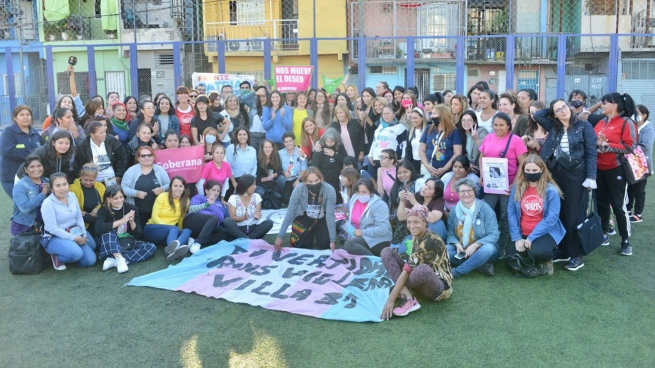The Ministers of Women of Argentina and Chile visited this Monday social projects led by women and trans people in the Ward 31which concluded with an assembly on the field of the women’s soccer club Ourswhere the importance of territorial public management was the common denominator of the meeting.
It is the first time that two Ministers of Women from neighboring countries tour the historic Buenos Aires neighborhood located in the Retiro area.
“It is the first time because before our position did not exist”says to Telam Elizabeth Gomez Alcorta, Minister of Women, Gender and Diversity, while walking the traditional corridors of the neighborhood. next to her Chilean pair, Antonia Orellanahead of the Ministry of Women and Gender Equity.
They arrived there at the request of the Chilean minister: “I asked Antonia what she wanted to do in the two hours she had free, outside of protocol activities, and she told me she wanted to go to the territory. And here we are,” says the Argentine official.
Orellana is the youngest minister in the cabinet of Chilean President Gabriel Boric, who arrived in Argentina this Sunday, on his first official visit as president of that country.
The Chilean minister is moved at various times during the tour of the neighborhood.
She is relaxed, she asks the women to tell her where she is walking while she looks at the map made by the local Feminist Assembly to identify the housing crisis and demand an inclusive urbanization.
The walk is with women and dissidents who sing the “alert, alert that walks, the feminist struggle for Latin America”.
And for the Chilean minister, feminism “is a political transformation.”
“It was important to meet you. We live in a moment of feminist politicization“, he told the women of the neighborhood.
During the tour, there were a few stops. One in a picnic area where there is also a gender space with a telephone guard so that the neighbors can access services and assistance when they need it.
“I asked Antonia what she wanted to do in the two hours she had free, outside of protocol activities, and she told me she wanted to go to the territory. And here we are.”Elizabeth Gomez Alcorta
Another moment was to learn about the feminist map that shows that the urbanization process of the neighborhood “lacks a gender perspective that is noticeable in indebtedness, in access to housing, in the cadastral registry“, explains Silvana Olivera of the Feminist Assembly.
In the Casa Diversidad Trans Villera, the officials go to see the sewing workshop that employs 13 people thanks to the state program Produce, a guided tour with enthusiasm by Martina Pelinco, head of the enterprise.
“This state support allows us to have more work, decent work and that makes us free. And she is from a political background, because we are learning about our rights,” Martina tells Minister Orellana, who is holding Tupac Amaru, the workshop’s dog, in her arms, while she looks at the garments that are being made.
With @totiorellanag We visited the Mugica neighborhood, in CABA, and we met with references from women’s and LGBTI+ organizations.
We are moving forward together to continue expanding the north of transformation. It is the alert that walks through Latin America. ?? pic.twitter.com/m4Etvl4TeI
— Eli Gomez Alcorta (@EliGAlcorta) April 4, 2022
There are selfies with the neighbors during the visit, which was joined by legislators and activists from social organizations.
The ministers agree in answering that the reality of feminized poverty and the need for care policies are priorities in their efforts.
Before the visit to Barrio 31, both signed a cooperation agreement for the design, implementation and monitoring of public policies on gender and diversity, which will allow exchanging experiences and assistance in the development of methodologies, training, internships, instruments, strategic documents and in the development of joint programs and policies, according to the official document.
The tour of the officials ended at the neighborhood field, home of the historic women’s soccer club ‘Ours’ that emerged in Villa 31 15 years ago at the hands of Mónica Santino, player and technical director.
On the court, in chairs arranged in a circle, the activity closed with a feminist assembly.
The first to speak was Santino: “The transformations are collective” and “there is another way of doing politics, also from a place of tenderness”, are some of his outstanding phrases, while Orellana nodded and allowed himself, once again , the emotion.
spoke representatives of the Feminist Assemblyof the movement Not one less and Monica Meninifrom Catholics for the Right to Decide and Feminist Advocacy.
At the close of the activity, Orellana analyzes that “if today in Latin America there is power to transform and to recover everything that has been regressed these years due to neoliberal policies, it is because women are the mainstays of political transformation in the institutional framework and in the work in the neighborhood. It is in that work in neighborhoods where we find how to make truly inclusive and egalitarian politics”.
And Gómez Alcorta acknowledges that both are “deeply aware of the responsibility“that it touches them and that the ministries of Women “they are a conquest of the streets”.
“The feminists, the popular and national governments, govern in the State and in the streets and the territories. It is important to take care of all the spaces. In short, any defeat can be transitory, but if we lose the territories those defeats can be strategic and it is the that we can never afford, not even in difficult moments, of crisis”, he adds.
“We must build politics in another way and it is part of what we have learned at this time: that differences can never put all the work ahead of us at stake,” adds the Argentine official.
And the meeting ends by saying to her Chilean colleague: “We celebrate your triumph, we are going to accompany you, we are allies. We know that all of Latin America will be feminist.”
Do you know who those women are? Télam asks a 10-year-old girl who watches how the circular assembly is disarming.
“If they are two women ministers“, he says with the naturalness of a generation protagonist of egalitarian changes.
















